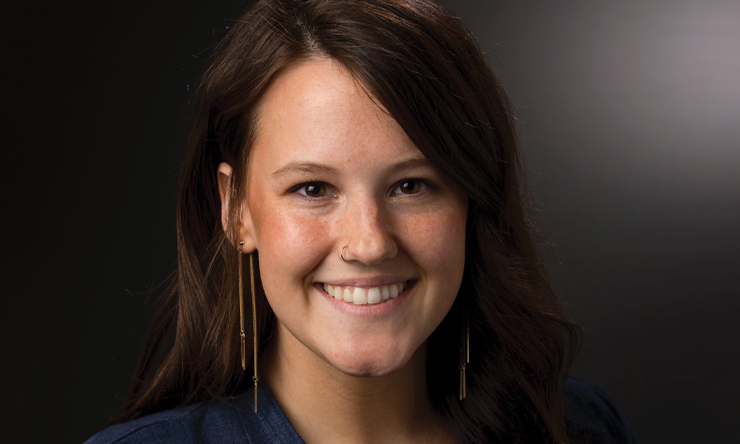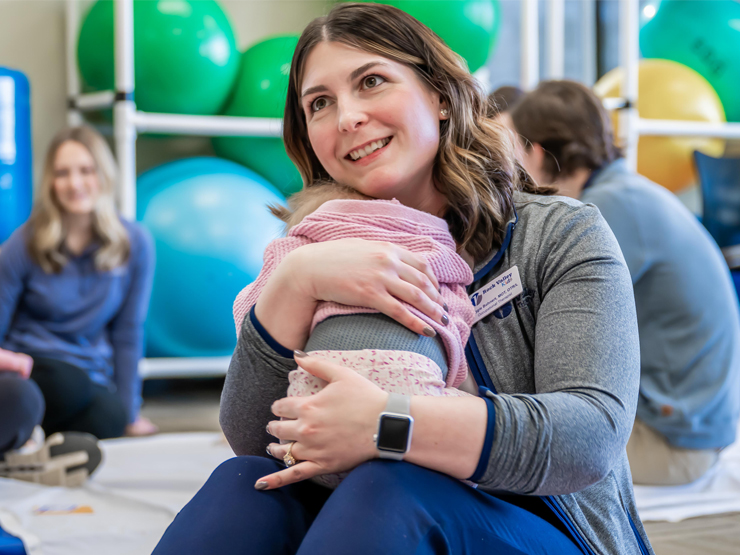Priscilla holds high the tattered white bag containing her family's only possessions, hoping someone in the terminal will recognize it. People brush by without noticing, unaware of her plight. Her mind-on information overload. Her back-sore, not so much from the 24-hour flight she just endured than from the weight of her daughter Rachele, just two, tied to her back with a sheet. The toddler's cries rise above flight announcements that are gibberish in Priscilla's ears.
Eleven-year-old Ignase is brave, or acting that way, his big black eyes windows to his true feelings. Shadarack and Jean Marie hold on, so tight, to the pant legs of their father, Diomede, worried that they might get sucked into the crowd passing by.
This anxiety, this fear, is all too familiar.
Then, her gaze homing in on the white bag she's been searching for, an airport employee approaches the family with a welcoming smile. "Follow me," she says in English.
And although Priscilla doesn't understand, although none of them does, they follow the woman to their new life in America.
Half a year has passed since that January evening, yet the images of the refugees from her birth country appearing at the far end of the airport terminal play on permanent rewind in the mind of St. Ambrose student Ernise Tuyishime: the relief on Diomede's face, the fatigue on Priscilla's. Little Rachele finally sound asleep. Six-year-old Shadarack swimming in the oversized Chicago Bears coat he'd been bundled into. The white bag that remained clutched in Priscilla's grasp, its contents a mystery.
"Never in a million years would I have expected to come face-to-face with a family from Rwanda here in the Quad Cities," Ernise says.
She had learned just days earlier that a family from Rwanda-her Rwanda-was en route to the Quad Cities, and that students from the SAU chapter of Phi Eta Sigma, a freshman honor society, had taken on the tremendous responsibility of helping the refugees transition to life in America.
Ernise worried that the students might not succeed, that the family might not succeed. This was, after all, middle-America, not exactly a melting pot of people from around the world, east-central Africa in particular, who could provide the Rwandan family with at least a sense of the familiar if not the vital support system needed to survive in their new country.
As she walked out of the airport, Ernise couldn't help but think about the stifling sub-Saharan climate and tent city she knew the family had come from. Emigrating from Rwanda with her parents when she was a child and educated in Europe, she had experienced only the former, so she couldn't fathom the kind of desperation in the refugee camps that would compel an entire family to leave the only life they'd ever known for a strange land. And they were about to experience two drastic differences from where they came: a full-fledged Midwestern winter-and a home with a door.
She would soon learn the family's biggest concerns were more elemental. As their car pulled away from the airport, Ernise found herself scrunched in the back seat with the family. "Priscilla hadn't said a word since meeting us," she recalls. "But then-and I will never forget this-she looked up at me and said quietly, ‘I can't believe you speak my language.'"
And for the first time a smile formed on her exhausted face. "I prayed to God that someone here would be able to speak with me."
Rising above the hate and violence
The family's journey began long before they stepped on the plane to America. More than a decade earlier Priscilla*, a Hutu, had fled her village on the Rwandan border. Tutsis from neighboring Burundi were retaliating against Rwandan Hutus for the mass genocide aimed at exterminating the entire Tutsi tribe in that country.
Over the course of 100 days in the summer of 1994-one that should never be forgotten, one that she can't-more than 800,000 Tutsis and moderate Hutus, such as Priscilla's first husband, were murdered. Pregnant with their child, she managed to escape to the tent city that would serve as her home for nearly 12 years.
Yet in that refugee camp, Priscilla found reasons to persevere: in her newborn Ignase, and in a man-a Hutu also-who had fled the violence occurring in Burundi.
So while both countries descended into chaos, two people rose above the hate, forging a new relationship in which the tribe one belonged to or the country one came from wasn't what mattered. Love did.
But in these most horrific of times, could hope survive?
The essentials for getting by
To senior Gil Cervelli, president of Phi Eta Sigma, it seems unreal that he and other members of the honor society decided to take on helping a refugee family from Rwanda transition into a new life in America. Yet, even without fully comprehending what they were getting into, they were willing to deal with whatever was thrown at them. After all, that was what the refugees would have to do.
In fact, even World Relief of Rock Island, the sponsoring organization that brought the family to the Quad Cities, wasn't sure what Priscilla, Diomede and their children were getting into. For years, the organization has assisted refugees, "but this was the first case from Rwanda that actually ended up coming to the Quad Cities," says Ann Grove '74 of World Relief. But she swears that "the stars were aligned when St. Ambrose agreed to help and that there were students on campus who could speak the family's native tongues of Swahili and Kenyan-Rwandan."
During the week prior to their arrival, the students mobilized, collecting used furniture, car seats and strollers, clothing and kitchen appliances, and moved them into a two-story duplex in Rock Island. "We took donations from the community and filled carts at Wal-Mart with the essentials the family would need to get by," says Gil.
At the time, though, none of the students truly knew just what "getting by" meant. But they quickly got an inkling, after spending the first few weeks trying to explain to the family the difference between dish soap and laundry detergent, that the toilet had a specific use and wasn't a plaything. And that snow pants were worn outdoors, not as pajamas.
The closest you can be to prison
During the academic year, the students took turns visiting the family three times a week, typically for two hours in the afternoon. They did this on top of their classes, homework and extra-curricular activities. It was not easy, in many ways.
"There have been plenty of moments of frustration, for us and the family," confesses senior Sara Miller. "We'd show up at the house ready to get to work, to try to teach those things they need to know. But you wondered if they were really grasping anything."
Weeks went by, and noses were still identified as legs. Eyes were still ears. Toes, still fingers.
Senior Kaba Kayembe understands the family's struggles, more so than the others, even Ernise. A native of the Democratic Republic of Congo, a country rife with its own conflicts, Kaba fled his country three years ago with the assistance of his uncle, a priest in the Davenport Diocese. Kaba knows what it's like to be in a foreign land, unable to comprehend the difference between words as simple as the and at, he and it.
"It is the closest you can be to prison" without being confined behind bars, he says. "Not being able to speak to people, to not understand the language, you simply cannot be independent. Your rely on people all of the time-to grocery shop, to get a haircut, to pay a bill."
His expression grows somber. He is reliving the isolation he felt. "It makes me double my efforts to help the family adjust. But it's going to take time."
The life they deserve
The need to work seems to consume Diomede. Observing his children and wife studying English from his perch on the third step of the staircase, he quietly asks Kaba, "Have they found a job for me yet?" Anxious whether this time the answer will be "yes."
Kaba knew the question was coming-it always does. "Diomede wants to work so badly, to provide for his family," he says later. "He wonders how long he's going to be waiting." He pauses. "I don't know what to tell him. No one is going to get a job here without an education."
The seriousness of the moment fades as Diomede and Kaba watch junior Jamie Saunders work with Ignase and Shadarack, the two oldest.
"Who has the notebook?" she asks.
"I have the notebook," Ignase says.
"Ignase has the notebook," Shadarack chimes in.
This exchange is followed by an excitement close to winning an Olympic gold medal, high-fives and applause notwithstanding. Even four-year-old Jean Marie and little Rachele join in the celebration. The perennially stern Diomede is no longer able to hide the pride he feels.
While the family talks little about the danger they came from, Diomede does speak often about why coming to America was so important to him: so his kids could be given the life they deserve.
This is not typical, Ernise says. "Most Rwandans have many, many children. This is a cultural thing-health is not good there and many kids die soon after they're born. The hope is that enough will survive and grow up to take care of their parents and grandparents. To Diomede and Priscilla, this is less important.
"Someday, after the kids are educated, working, established, Diomede says he might like to return to his homeland," she adds. "He has family there, he had a job there."
"Do you think Ignase can get some type of education?" he asks Kaba now. "Go to college, like you?"
"I thought about myself for a second, about how I got to college," Kaba later relates. It's been a difficult three years, but here he is. "I turned to him and told him ‘yes.'"
'Yes' for the rest of our lives
Much has changed since that first night in America: The children are focused on their studies. The boys no longer mistake girls' clothing for boys', and they're eating more. Shadarack, once thin, actually has a belly. Diomede's job prospects are still uncertain, but Priscilla has started wearing makeup, a sign, Grove says, that she feels her basic needs and those of her family are being met. Little Rachele is always happy-until nap time. She'll grow up knowing a life no different than this one.
And this life is becoming easier-they know their way around a grocery store. The front of the refrigerator is populated with certificates of achievement received in English as a Second Language classes.
"This family has a greater chance of working up and out because of the St. Ambrose students," says Grove. "They've embraced this family, and established a relationship of caring and empowerment."
But what about the future? Aid to the family will eventually be cut. The government will expect independence. The St. Ambrose students will graduate.
Yet a group of them continue to visit the family weekly through the summer. And this fall, when the campus is hopping again, Gil says there will be a new contingent of students knocking on the apartment's door and waiting for Priscilla to answer it.
"When we said ‘yes' to this project, we weren't saying we would do it for a couple of months, wish the family well, and go back to our college lives," says Sara. "We didn't realize this at the time, but we said ‘yes' for the rest of our lives. This is a family that we will continue to visit, continue to nurture, continue to teach and continue to learn from."
Indeed, there's a lot to learn. "They've shown us what it means to follow your heart, to beat the odds, to confront the legacy of the past and tackle the challenge of the future," she says.
Because within the tattered white sack that Priscilla brought with them from Rwanda, amidst the few material belongings, was the family's most precious possession: hope. Rekindled hope.
*The family's last names are not being used as a precaution. Many of their relatives live in Rwanda, where dangers still exist.
News
Share This Story



